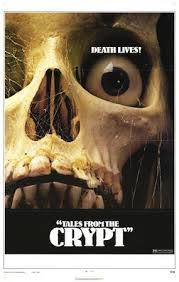
TALES FROM THE CRYPT
UK, 1972, 92 minutes, Colour.
Ralph Richardson, Geoffrey Bayldon, Joan Collins, Ian Hendry, Peter Cushing, Robin Phillips, Richard Greene, Barbara Murray, Roy Dotrice, Nigel Patrick, Patrick Magee.
Directed by Freddie Francis.
A above average horror chiller that sets itself up as an explicitly modern morality play, hosted by a mysterious friar, Ralph Richardson, who sends five people back into their consciences to become aware of their potential for evil. Five brief tales concerning Joan Collins, Ian Hendry, Robin Phillips, Richard Greene and Nigel Patrick, provide adequate variety. The last two are particularly frightening in their conclusions. Top-class British actors take part effectively. Peter Cushing stands out, not as a basically horrible character, but as a sympathetic, lonely old man. Well-produced and imaginatively directed, it is well worth seeing with the caution that some sequences are quite frightening.
1. The overall appeal of horror films? The nature of audience interest, excitement, fear? The realms of dreams and fantasies? Audiences indulging their fears and dreams in horror films? Being able to cope with the horror? The effect of this film?
2. The overall impact of five stories in one film? The impact of each, their cumulative effect? The variety of fear?
3. How effective was the framework of the film and its mystery? Audience interest and involvement in the tour of the crypt, the words of the crypt keeper and the guide, the invitation to the five people concerned? The background of the moral fable? The points being made, the tone? The revelation that these people were ultimately in hell? The moral fable as focussing on sin, guilt, repentance?
4. How well portrayed were themes of justice, sin and crime, punishment and retribution? Did it reveal something of what hell is, to live eternally with one's guilt?
5. The story and all through the house: the ordinariness of the setting, the irony of the Christmas atmosphere, the atmosphere of wealth, Joanne and her glamour, her suddenly turning vicious and murdering her husband? The device of the broadcast to talk about the maniac? The daughter and the irony of her joy at Christmas? Joanna and her fear, the shock of the Santa Claus? The irony of the daughter letting Santa in and murder being done? The basic message of this fable?
6. The story reflection of death: the use of the dream structure, subjective photography, the irony of the two crashes and the sense of menace? What kind of person was Maitland? The nature of his guilt? His treatment of his wife, of Susan? The dream and the nightmare and his new awareness of his life, his wife and of Susan, people recoiling in horror against him, the mirror and the revelation of the truth? Audience response to the fact that he was dreaming and about to crash again? The message of this fable?
7. The story, 'Poetic Justice": the atmosphere of quiet and gentleness, the atmosphere of the town? The overall emphasis of evil and horror at the end? How sympathetic a person was Grimsdyke? Audience pitying him, a victim of Elliot, of the town? The pathos of his suicide? The contrast with the arrogance of Elliot and his harshness? The filling in the story with the ordinary types as the Vicar and the Postman etc.? The ugliness of Grimsdyke's revenge on Elliot and his not having a heart? The message of this fable?
8. The story 'Wish you were Here': a portrayal of evil people, the world of big business and finance, the types, as revealed in their discussions and poses? The irony of having three wishes? The wife's foolishness in applying these? The husband and his suffering? The irony of his being in heart attack, the irony of the eternal corroding of the embalming fluid? Audience horror to this kind of visualization of eternal punishment-- The message of this fable?
9. The story 'Blind Alley*: the atmosphere of the blind men's home and its sense of menace? The men overpowering Rogers and the horror of his two alternatives? The horror of his dogs? The visual and sinister presentation of the corridor of razor blades and darkness? The moral of this fable?
10. Comment on the fact that these stories came from horror comics. What influence on their filming?
11. The value in entertainment and instruction of horror moral fables?